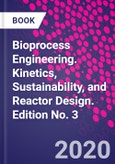Bioprocess Engineering: Kinetics, Sustainability, and Reactor Design, Third Edition, is a systematic and comprehensive textbook on bioprocess kinetics, molecular transformation, bioprocess systems, sustainability and reaction engineering. The book reviews the relevant fundamentals of chemical kinetics, batch and continuous reactors, biochemistry, microbiology, molecular biology, reaction engineering and bioprocess systems engineering, introducing key principles that enable bioprocess engineers to engage in the analysis, optimization, selection of cultivation methods, design and consistent control over molecular biological and chemical transformations. The quantitative treatment of bioprocesses is the central theme in this text, however more advanced techniques and applications are also covered.
Please Note: This is an On Demand product, delivery may take up to 11 working days after payment has been received.
Table of Contents
Part I: Fundamentals1. What is Bioprocess Engineering?
2. An Overview of Biological Basics
3. An Overview of Chemical Reaction Analysis
4. Batch Reactor
5. Ideal Flow Reactors
Part II: Kinetics and Molecular Interactions
6. Kinetic Theory and Reaction Kinetics
7. Enzymes
8. Chemical Reactions on Solid Surfaces
9. Protein-Ligand Interactions
10. Molecular Regulation
Part III: Cells: Function and Manipulations
11. Cell Metabolism
12. Evolution and Genetic Engineering
Part IV: Cultivation and Fermentation
13. How Cells Grow
14. Cell Cultivation
Part V: Bioprocess System and Reaction Engineering
15. Sustainability and Stability
16. Combustion, Reactive Hazard and Bioprocess Safety
17. Mass Transfer Effects: Immobilized and Heterogeneous Reaction Systems
Part VI: Reactor Engineering and Quality Design
18. Bioreactor Design & Operation
19. Real Reactors and Residence Time Distributions
20. Design of Experiment








